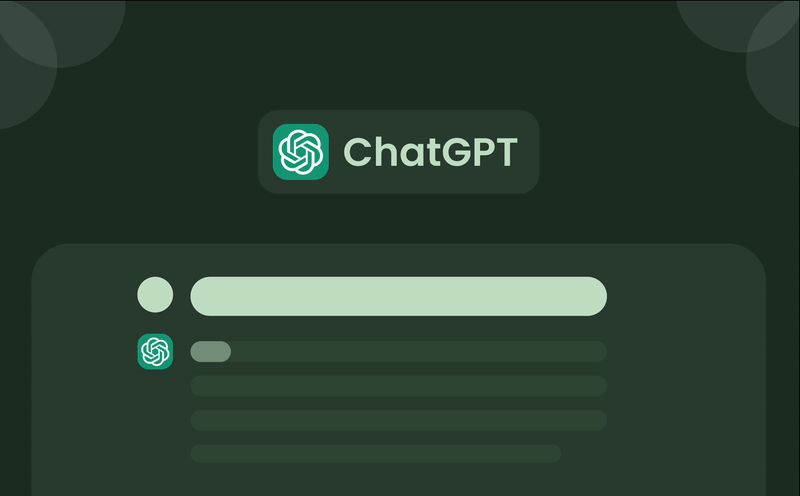在流量成本飙升的跨境战场,SEO仍是性价比最高的长期增长引擎。但传统SEO需要大量人力分析数据、优化内容——直到ChatGPT等AI工具出现。
ChatGPT可作为辅助工具,帮助完成关键词研究、内容优化等技术性任务。本文整理了部分经过验证的英文Prompt模板,覆盖SEO主要场景,并提供使用说明,便于直接应用。

01 用AI挖出精准长尾词
1. 生成种子关键词
⭕ Prompt:
“Generate 30 semantically relevant topics under ‘[industry]’, output in table with search intent analysis”

说明:
– 替换[industry]为具体领域,如“digital marketing”
– 通过“search intent analysis”列区分信息型、商业型关键词
– 继续追问:
Prompt:
“From the table, select top 5 keywords with highest commercial potential and explain your reasons”
2. 扩展长尾关键词
⭕ Prompt:
“Suggest 15 long-tail keywords for ‘[seed keyword]’, including geographic or usage scenario modifiers”
✅ 示例:输入“sustainable fashion”,可能输出“affordable sustainable fashion for college students in California”

⚠ 注意事项:
– 添加限定条件提升质量,如:“Exclude purely informational keywords”
– 通过seo工具(Ahrefs等)二次筛选
3. 关键词聚类分析
⭕ Prompt:
“Cluster these 50 keywords into groups based on user intent: [keyword list]. Provide content topic suggestions for each cluster”
✅ 应用场景:
– 制定内容日历
– 优化网站结构
02用AI“透视”竞对流量命门
1. 内容差距分析(需GPT-4o+Web Requests插件)
⭕ Prompt:
“Analyze content gaps between my site [URL] and competitor [URL]. Prioritize opportunities by search volume and content type”
操作步骤:
输入自身网站与竞品URL
获取差距关键词列表
后续追问:
Prompt:
“For the top 3 gaps, suggest specific content structures (e.g., comparison articles, step-by-step guides)”
2. 竞品关键词漏洞挖掘
⭕ Prompt:
“Identify 10 keywords where [competitor] ranks highly but has thin content or weak backlinks. Provide actionable optimization strategies”
✅ 输出示例:
– 内容薄弱点:缺乏数据支持/未更新最新政策/缺少多媒体元素
– 优化建议:添加行业报告引用/整合法规变化/插入信息图表等
03 页面优化自动化
1. 标题标签(Title Tag)优化
⭕ Prompt:
“Rewrite the title tag ‘[original title]’ to include the primary keyword ‘[KW]’, keep under 70 characters, and improve click-through rate”

✅ 优化原则:
– 前30字符包含核心关键词
– 添加价值提示词,如“Step-by-Step”“2025 Guide”
– 避免重复:同一关键词最多出现2次
2. 结构化内容设计
⭕ Prompt:
“Create an H2-H4 outline for ‘[topic]’ that covers the keywords and follows logical progression from basic concepts to advanced applications”
✅ 示例输出:
H2: What is [Topic]?
H3: Core Components of [Topic]
H3: Industry Applications
H2: 2023 Trends in [Topic]
H3: Emerging Technologies
H3: Regulatory Changes
04爆款内容流水线
1. 引言段落优化
⭕ Prompt:
“Write a 120-word introduction for ‘[topic]’ that addresses common pain points and naturally includes keyword ‘[KW]’”
✅ 建议:
行业现状描述
现存问题陈述
本文解决方案预告
2. 内链策略制定
⭕ Prompt:
“Suggest 5 relevant internal links for an article about ‘[current topic]’. Use anchor texts from [sitemap URL] and specify insertion points”
操作步骤:
1. 导出网站现有文章列表
2. 选择相关性高的3-5篇旧文
3. 在上下文自然插入锚文本
05 AI帮助人工审核
尽信AI不如无AI。AI能够快速提升工作效率,可人的思考和判断力是必须保留的。AI生成的内容仍需要严谨的人工审核及判断。
1. 数据验证
– 检查AI生成数据的准确性(如虚构的统计报告)
– 验证Prompt:
⭕ Prompt:
“Confirm if this statement is factually correct: [quote from previous response]”
2. Prompt原则
具体 > 广泛
❌ prompt
“Write an SEO article”
✅ prompt
“Write a 1500-word guide on ‘[topic]’ with 3 case studies and 5 actionable tips. Target keywords: [list]. Tone: professional”
– 分步请求:复杂任务拆解为多个Prompt
06结 语
为了提升工作效率,使用AI的时候也最好建立系统化AI使用流程。
最后,总结一下如何流程化使用:
标准模板库 – 保存常用Prompt,形成标准的prompt库
持续优化 – 每月更新Prompt库,结合具体操作更新优化prompt
人机协作模式 –
AI负责:数据整理/框架规划/技术代码
人工负责:策略制定/专业审核/用户体验优化



